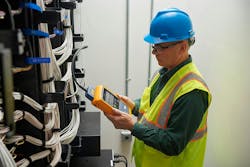Whether you're an installer, contractor or end-user, understanding the significance of certification is vital to ensuring the reliability, performance and longevity of your cabling infrastructure. In this article, we will explore why network certification is a fundamental aspect of modern networking and how it benefits various stakeholders in the industry.
What is network cabling certification?
Network certification, in the context of structured cabling systems, involves a comprehensive testing process to determine whether the installed cabling infrastructure meets specific industry standards and performance criteria. This process typically includes connecting testing devices to each end of the cable, conducting measurements and comparing the results against predefined limits set by relevant standards or customer requirements. The results are documented in a certification report.
While certification testers represent a significant initial investment, they provide long-term value by ensuring the integrity of tens of thousands of cables over their lifespan. Even though the labor required for testing and documentation adds approximately 5% to the installation cost, it can reduce costs by eliminating return repair calls, future failures or disputes between a contractor and facility owner.
Copper and fiber
The world of network certification is governed by industry standards established by organizations like the Telecommunications Industry Association (TIA) in North America and the International Organization for Standardization (ISO) internationally. These standards, often categorized as "category" or "class" standards, set the guidelines for certifying copper and fiber cabling systems.
For a cabling link to receive certification, it must be constructed from certified components, such as cables and connectors. Testing the installed link is vital to ensure that workmanship issues do not compromise its overall performance.
Benefits and requirements
In many cases, project specifications demand network certification as a prerequisite for long-term warranties on the cabling installation. These warranties can extend for 20 years or more and are offered by reputable cabling suppliers. Certification reports become the tangible proof that the cabling infrastructure meets the required standards, granting peace of mind to end-users.
Beyond meeting customer requirements, network certification offers several advantages:
- Proof of correct installation: Network issues can manifest immediately or even years after installation due to equipment upgrades and evolving requirements. Certification reports serve as irrefutable evidence that the installation was done correctly, protecting installers from costly callbacks and disputes.
- Identifying faulty cabling: Certification testing can uncover issues with cables or connectors that may otherwise remain hidden until network problems occur. By identifying these problems early, certification testing saves time, money and reputations.
- Quality control: Manufacturers often require certification testing to validate warranties. By adhering to certification standards, installers ensure they meet manufacturer best practices and maintain a high level of workmanship. This can also serve as a competitive advantage.
Warranties and troubleshooting
Cabling system warranties offered by leading manufacturers play a crucial role in guaranteeing the performance and longevity of a structured cabling system. These warranties extend up to 20 or 25 years, ensuring that the cabling infrastructure can support current and future applications.
However, manufacturers impose strict requirements for these warranties, including the need for certification testing. This ensures that certified installers maintain the highest quality standards, protecting both end-users and the manufacturers themselves.
Certification test results are not only essential for warranty purposes but also serve as invaluable troubleshooting tools. These results provide a benchmark for network professionals to identify and address issues efficiently. With certification results in hand, technicians can confidently move on to diagnose other potential causes, streamlining the troubleshooting process.
For contractors and installers, certification testing is not just a mandatory step—it is insurance. Having certification test results readily available can prevent costly callbacks and provide a competitive edge in the market. Certification testing offers assurance to customers that their network infrastructure is of the highest quality, encouraging them to choose a contractor with a proven track record.
Mark Mullins is one of the founding members of Fluke Networks, starting in 1993. He has been involved in all key areas of the business, including cable testing, network troubleshooting and analysis. He currently oversees the company’s global communications efforts, keeping customers and prospects up-to date on cable testing products and technologies.


